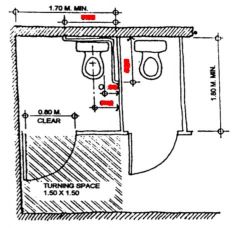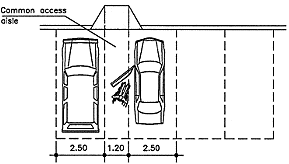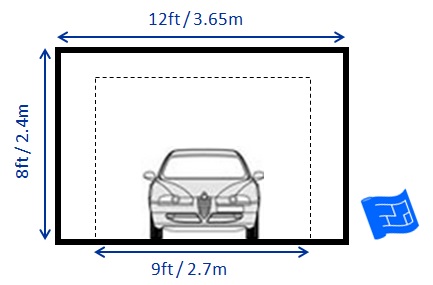Changes to accessible car parking designs from 1 May 2011
In computing for parking slots, a fraction of 50% and above shall be considered as one car parking slot. In areas where adequate public parking lots/multi-floor parking garages are available within 200 m of the proposed building, only 30% of parking requirement need to be provided within their premises.
- PARKING AND LOADING SPACE REQUIREMENTS: this is the standard requirements for parking based on Building Code of the Philippines v Size of average parking are is 2.4mx5m for perpendicular or diagonal parking. V 2mx6m for parallel parking.
- The minimum and maximum dimensions for spaces in the built environment should consider the following criteria: 1.2.1 The varying sizes and statures of persons of both sexes, their reaches and their lines of sight at both the standing and sitting positions. 1.2.2 The dimensional data of the technical aids of disabled persons.
On the 1 May 2011 the Commonwealth Disability (Access to Premises – Buildings) Standards 2010 (Premises Standards) was introduced resulting in dramatic changes to accessibility requirements in and around buildings.

The objectives of the Premises Standards are to ensure that ‘dignified, equitable, cost-effective and reasonably achievable access to buildings, and facilities and services within buildings, is provided for people with a disability'. It also aims to give certainty to building certifiers, building developers, building managers and other practitioners that compliance with the Access Code, forming Schedule 1 of the Premises Standards will achieve compliance with Section 23 of the Disability Discrimination Act 1993 (Access to Premises). The Premises Standards apply to new buildings and existing buildings undergoing building work.
The Access Code has been replicated within the Building Code of Australia, which now references three new Australian/New Zealand Standards that impact on car park designs:
Purchase Bollards Here
Poker theme decoration ideas. Purchase 1300mm High Blue Flexible Disabled Carpark Bollards

New references adopted into the Building Code of Australia in 2011
1. ‘AS/NZS 2890.6-2009 Off-street parking for people with disabilities';
2. ‘AS/NZS 1428.4:2009 Means to assist the orientation of people with vision impairment – Tactile ground surface indicators' ; and
3. ‘AS1428.1-2009 General requirements for access – new building works'
AS/NZS 2890.6-2009 sets the minimum requirements for accessible car parking spaces in Australia and New Zealand and replaces the previous reference (Appendix C of AS2890-1-1993).
Customer service hinges on the ability of an organization to understand and be sensitive to the needs of their customers. Persons with disabilities are paying customers too, no different from everybody else, except for the discounts, which the government reimburses by way of tax incentives. Still it is good business to develop and improve services for all customers, including the Pinoys with disabilities.
Customer service means that the staff does not discriminate their customers because each sale directly contributes to the store's and the employee's livelihood. Even a giant corporation like SM is careful in showing the littlest sign of discrimination in both their employees and their customers. In one viral instance, the manager of SM Telabastagan in Pampanga unceremoniously ejected a group of deaf diners from the food court. Why? Because the group was supposedly too loud and were allegedly disruptive to the other diners.
After that incident went viral, many people got upset with the manager and the management of SM was compelled to issue an apology and perhaps some form of reparation. Without social media, that incident would have gone unnoticed and the manager, unrepentant.
Pwd Parking Slot Dimension
While being called out on social media is one thing, being aware and sensitive to the needs of PWD customers is quite another.
Pwd Parking Slot Dimensions Meters
PWD customers are a niche of customers that many companies have ignored until recently when RA 10754 was passed in 2016. Not only were the benefits of PWDs expanded to include VAT exemption, qualification for the PWD ID became another subject of much debate as many are beginning to realize that they are persons with disabilities but have let denial deprive them of their benefits under the law. It wasn't just a matter of better parking and coding exemptions: it was recognition of their existence and upholding of their rights under the law.
Which again brings us to the question, why do many companies chose to ignore their PWD customers? The most basic answer; they do not know what to do when they encounter a PWD customer. To avoid customer service booboos, they just ignore them entirely and treat them like everybody else. PWDs do want equal treatment but there needs to be context when qualifying the meaning of the term 'social equality.' Stairs need to have ramps, PWDs must have a special express lane, parking slots must be reserved for the exclusive use of the PWD and PWDs must be given their 20% discounts and 12% VAT exemption. Not because the service provider is generous, but because it is the law. Business can no longer avoid dealing with PWDs because the law recognizes that we all live together in this beautiful country and, I will not use the term in its proper context, must enforce 'social equality.'
So how to give all customers all smiles? By learning more about their clientele, including the PWDs. In 2010, the Philippine Statistics Authority said that 1.7% of the Philippines' population lives with some form of disability. By 2016, the United Nations says there are 1 in every 7 persons in the world who suffers from some form of disability. We are now more than 100 million and by 2017, it has been estimated by a study commissioned by a foundation for children with autism that the number of PWDs in the Philippines might number up to 10% or higher. The Philippine government has yet to confirm the exact number of Pinoys with disabilities as a study has yet to be done. So how does this affect businesses? Quite heavily.
PWDs, whether they are employed or not, whether they have their own money or not, are spenders. In fact, they are big spenders, sometimes accounting for up to or sometimes more than 50% of a family's expenditures (according to a survey published by the Disability and Health Journal in Oct 2017). Note than this is not a call for businesses to take advantage of PWDs. This is a call for the need to be aware and sensitive to their needs simply because their caretakers and families are some of a mall's biggest customers. So it is just right (and legal) to give them good service when they try to buy something.

Here are some of the tips that may be most helpful when working with PWD customers:

The objectives of the Premises Standards are to ensure that ‘dignified, equitable, cost-effective and reasonably achievable access to buildings, and facilities and services within buildings, is provided for people with a disability'. It also aims to give certainty to building certifiers, building developers, building managers and other practitioners that compliance with the Access Code, forming Schedule 1 of the Premises Standards will achieve compliance with Section 23 of the Disability Discrimination Act 1993 (Access to Premises). The Premises Standards apply to new buildings and existing buildings undergoing building work.
The Access Code has been replicated within the Building Code of Australia, which now references three new Australian/New Zealand Standards that impact on car park designs:
Purchase Bollards Here
Poker theme decoration ideas. Purchase 1300mm High Blue Flexible Disabled Carpark Bollards
New references adopted into the Building Code of Australia in 2011
1. ‘AS/NZS 2890.6-2009 Off-street parking for people with disabilities';
2. ‘AS/NZS 1428.4:2009 Means to assist the orientation of people with vision impairment – Tactile ground surface indicators' ; and
3. ‘AS1428.1-2009 General requirements for access – new building works'
AS/NZS 2890.6-2009 sets the minimum requirements for accessible car parking spaces in Australia and New Zealand and replaces the previous reference (Appendix C of AS2890-1-1993).
Customer service hinges on the ability of an organization to understand and be sensitive to the needs of their customers. Persons with disabilities are paying customers too, no different from everybody else, except for the discounts, which the government reimburses by way of tax incentives. Still it is good business to develop and improve services for all customers, including the Pinoys with disabilities.
Customer service means that the staff does not discriminate their customers because each sale directly contributes to the store's and the employee's livelihood. Even a giant corporation like SM is careful in showing the littlest sign of discrimination in both their employees and their customers. In one viral instance, the manager of SM Telabastagan in Pampanga unceremoniously ejected a group of deaf diners from the food court. Why? Because the group was supposedly too loud and were allegedly disruptive to the other diners.
After that incident went viral, many people got upset with the manager and the management of SM was compelled to issue an apology and perhaps some form of reparation. Without social media, that incident would have gone unnoticed and the manager, unrepentant.
Pwd Parking Slot Dimension
While being called out on social media is one thing, being aware and sensitive to the needs of PWD customers is quite another.
Pwd Parking Slot Dimensions Meters
PWD customers are a niche of customers that many companies have ignored until recently when RA 10754 was passed in 2016. Not only were the benefits of PWDs expanded to include VAT exemption, qualification for the PWD ID became another subject of much debate as many are beginning to realize that they are persons with disabilities but have let denial deprive them of their benefits under the law. It wasn't just a matter of better parking and coding exemptions: it was recognition of their existence and upholding of their rights under the law.
Which again brings us to the question, why do many companies chose to ignore their PWD customers? The most basic answer; they do not know what to do when they encounter a PWD customer. To avoid customer service booboos, they just ignore them entirely and treat them like everybody else. PWDs do want equal treatment but there needs to be context when qualifying the meaning of the term 'social equality.' Stairs need to have ramps, PWDs must have a special express lane, parking slots must be reserved for the exclusive use of the PWD and PWDs must be given their 20% discounts and 12% VAT exemption. Not because the service provider is generous, but because it is the law. Business can no longer avoid dealing with PWDs because the law recognizes that we all live together in this beautiful country and, I will not use the term in its proper context, must enforce 'social equality.'
So how to give all customers all smiles? By learning more about their clientele, including the PWDs. In 2010, the Philippine Statistics Authority said that 1.7% of the Philippines' population lives with some form of disability. By 2016, the United Nations says there are 1 in every 7 persons in the world who suffers from some form of disability. We are now more than 100 million and by 2017, it has been estimated by a study commissioned by a foundation for children with autism that the number of PWDs in the Philippines might number up to 10% or higher. The Philippine government has yet to confirm the exact number of Pinoys with disabilities as a study has yet to be done. So how does this affect businesses? Quite heavily.
PWDs, whether they are employed or not, whether they have their own money or not, are spenders. In fact, they are big spenders, sometimes accounting for up to or sometimes more than 50% of a family's expenditures (according to a survey published by the Disability and Health Journal in Oct 2017). Note than this is not a call for businesses to take advantage of PWDs. This is a call for the need to be aware and sensitive to their needs simply because their caretakers and families are some of a mall's biggest customers. So it is just right (and legal) to give them good service when they try to buy something.
Here are some of the tips that may be most helpful when working with PWD customers:
1. If a customer shows you a PWD ID, take note of the number and give them the discount they are entitled to. DO NOT PRY into their personal life by making small talk in an effort to know what their medical condition is. Neither should a service provider doubt that the ID might have been given in error as the customer who claims to have a disability may not exactly have one in your opinion. You are not a doctor well enough to judge who has a disability, and which one does not. PWD ID applications are carefully scrutinized before they are given out. Plus the ID numbers are registered with the Department of Health. If in doubt, you may ask the Department of Health, but do not believe that the ID might not be genuine. However in the meantime, the PWD must be given the discount not kept waiting.
2. Do not shout at the deaf or blind people. If they are deaf, no amount of shouting will help. If they are blind, then you not need to shout. Do not be afraid to ask if they prefer to communicate using the written language for the deaf as many of them understand written English and Filipino. But it would be great if a mall or store had someone who knows a little sign language.
3. If the PWD customer is assisted by an interpreter, talk directly to the PWD, not to the interpreter. It is rude to do so.
4. Never assume the preference of the PWD customer on colors, taste and price. Just like any customer, let them choose and decide for themselves.
5. Never touch or assist a PWD if they do not ask for it. Do not move a PWD's wheelchair without permission. Never assume that seeing eye dogs are just pets, they are more than that. Treat them with the same respect as you would any customer.
If your organization is absolutely unsure of how to deal with PWD customers, call us at PWDPhil (946-2058). Our organization has volunteers that arrange for awareness and sensitivity seminars for your staff and front-liners. Or you may email us at info@pwdphil.com